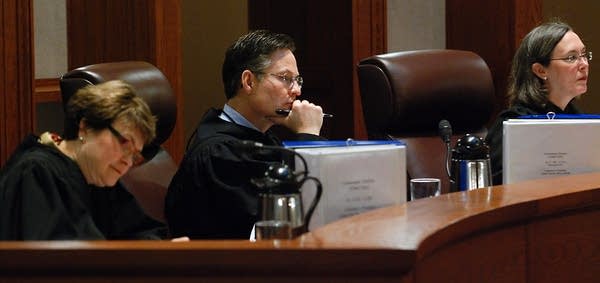Testimony of election officials continues in Senate trial
Go Deeper.
Create an account or log in to save stories.
Like this?
Thanks for liking this story! We have added it to a list of your favorite stories.

Carver County elections manager Kendra Olson told the court on Tuesday that her county rejected 181 absentee ballots, because the witnesses who signed the ballots weren't registered Minnesota voters.
While she testified, Scott County Elections Supervisor Mary Kay Kes listened. And when it was her turn to take the stand, Coleman attorney Joe Friedberg wasted little time in posing that question to her.
"You heard the testimony that they check every witness to be sure they're a registered Minnesota voter. You heard that testimony?"
"I did."
Turn Up Your Support
MPR News helps you turn down the noise and build shared understanding. Turn up your support for this public resource and keep trusted journalism accessible to all.
"Do you do that in Scott County?"
"I do not."
"Why not?"
"It's not required by statute."
"Have you ever consulted with anybody about that?"
"I've asked other counties what they do, thinking, am I missing something in the law? And I get the same answer, 'no, we don't do that.'"
Friedberg asked Kes what other counties she checked with. She said Blue Earth but couldn't remember the other ones specifically. She said she hadn't checked with the Secretary of State.
When asked about whether Scott County would have counted the 181 ballots Carver did not, Democrat Al Franken's attorney David Lillehaug objected, saying that Kes' answer would be irrelevant, since the court last Friday ruled that witnesses who sign absentee ballots must be registered in Minnesota if they're not notaries public. The panel agreed with Lillehaug.
But Friedberg put the argument in the record for an appellate court to consider if Coleman appeals the panel's final decision.
Outside the court, Franken attorney Marc Elias said there is one standard for counting ballots and that's Minnesota law, even if counties make mistakes. Elias said he believes Coleman's camp is laying the foundation for future appeals.
"They are not going to be satisfied, as it seems, having lawful votes counted. Instead they're bringing the groundwork to bring this -- whether it's the State Supreme Court, the U.S. Supreme Court or the federal courts, I have no idea. But it's clear they're laying the predicate for another court."
Coleman legal team spokesman Ben Ginsberg said the difference in the way Carver and Scott counties counted absentee votes presents a classic case of voters in one county having a greater chance of getting their votes counted than in another, a violation of the constitution's equal protection clause.
Although the three-judge panel ruled last Friday that Minnesota had no systemic problem in the last election, Ginsberg disagreed and called it "a fatally flawed" election if the court continues to go down the same path.
"I don't know how you can say there's not a systemic problem when you have Scott County saying one thing and Carver County saying something completely different, meaning one rejecting 181 ballots and the other rejecting practically none," Ginsberg said. "I don't know how you can say there is not a problem when that's the testimony in the court."
The court also allowed Franken's side to amend its counterclaims in the case in light of Friday's ruling.
Franken's attorneys would not say whether they would increase the number of ballots they want considered from the original 771 they announced at the start of the trial.



